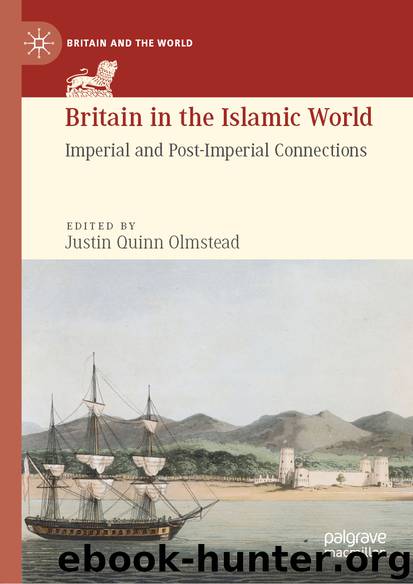Britain in the Islamic World by Justin Quinn Olmstead

Author:Justin Quinn Olmstead
Language: eng
Format: epub
ISBN: 9783030245092
Publisher: Springer International Publishing
By the 1880s, Wilfrid Blunt had become ‘the avatar for anti-imperial causes’ and an active force for the ‘regeneration of Islam’ by means of ‘agitation and negotiation as well as by poetry and horse breeding.’ 13 Blunt often used Arabian horse breeding at his fashionable Crabbet Park Estate to disseminate his political views among his social connections in the influential horse trading community, especially in Tory circles including George Wyndham, the Lytton family and even conservatives as prominent as George Curzon and Arthur Balfour. Blunt has been described by Roy Jenkins as a ‘rich Sussex squire, Arabist, honorary Irish nationalist and well known coureur’ and by Richard Toye as the ‘anti-imperialist in chief.’ 14 Blunt was enraged at Gladstone’s second government for its intervention and occupation of Egypt after a nationalist uprising led by Colonel Ahmed Urabi. 15 He believed the interventionist policy to be one of fiscal self-interest and blatant imperialism which was diametrically opposed to his vision for the Levant that he described in The Future of Islam (1882). Blunt’s far-sighted design interpreted the collapse of the Ottoman Empire as inevitable due to its excess and archaic use of the oppressive vilayet system which split the administration of the Middle East into small manageable regions. Once the Ottoman Empire had disappeared, Blunt reasoned that ‘The Caliphate—no longer an empire, but still an independent sovereignty—must be taken under British protection, and publicly guaranteed its political existence, undisturbed by further aggression from Europe.’ Furthermore, he advocated the creation of an Arabian state as home of the new caliphate. According to Blunt’s design, the English were singular among Europeans because they had a ‘tradition of tolerance towards Islam,’ which would result in ‘Moslems, recognizing this,’ and looking to ‘England as their advisor and protector.’ 16 According to Blunt, this was already evident in India. However, his faith in the British Empire as a progressive force in the Islamic World waned heavily after he published The Future of Islam, leaving Blunt increasingly politically isolated and on a course which was bound to part company with British politicians of all parties, ultimately leaving Blunt’s friendship with both Lord Randolph Churchill and Winston Churchill in tatters.
Wilfrid Blunt first became connected with the Churchill family after befriending Lord Randolph at a chess tournament in the Strand in 1883. Always on the lookout for political contacts to aid his quest for ending the recent occupation of Egypt, Blunt wrote to Randolph, one of the leading Tories, in November 1882 prior to their meeting and asked if Randolph would ‘defend the Egyptian nationalists against the charge of complacency in the Alexandria riots.’ 17 This led to an alliance and friendship between Randolph Churchill and Blunt which was lasted until Randolph’s death in 1895. Though parliamentary allies in the beginning were against Gladstone’s government, ultimately the issue of home rule for Ireland ended their political alliance once Gladstone moved towards Blunt’s position. 18
Download
This site does not store any files on its server. We only index and link to content provided by other sites. Please contact the content providers to delete copyright contents if any and email us, we'll remove relevant links or contents immediately.
| Africa | Americas |
| Arctic & Antarctica | Asia |
| Australia & Oceania | Europe |
| Middle East | Russia |
| United States | World |
| Ancient Civilizations | Military |
| Historical Study & Educational Resources |
Goodbye Paradise(3777)
Men at Arms by Terry Pratchett(2820)
Tobruk by Peter Fitzsimons(2489)
Arabs by Eugene Rogan(2285)
Borders by unknow(2284)
Pirate Alley by Terry McKnight(2205)
More Than Words (Sweet Lady Kisses) by Helen West(1841)
Belonging by Unknown(1840)
It's Our Turn to Eat by Michela Wrong(1706)
The Biafra Story by Frederick Forsyth(1635)
The Source by James A. Michener(1584)
Botswana--Culture Smart! by Michael Main(1583)
A Winter in Arabia by Freya Stark(1522)
Gandhi by Ramachandra Guha(1511)
Coffee: From Bean to Barista by Robert W. Thurston(1508)
The Falls by Unknown(1505)
Livingstone by Tim Jeal(1465)
The Shield and The Sword by Ernle Bradford(1382)
Africa: Altered States, Ordinary Miracles by Richard Dowden(1370)
